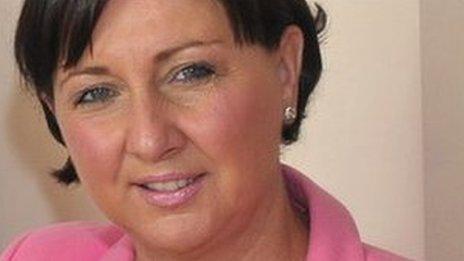Northern Ireland health service cuts to result in fewer beds
- Published
Valerie Watts, the chief executive of the Health and Social Care Board, says the cuts are regrettable but unavoidable
A number of hard-hitting cuts have been announced to health and social care services across Northern Ireland.
The cuts will mean potentially more than 100 fewer hospital beds and wards closing at the weekend.
Implementing the measures, which are described as temporary, will begin within weeks.
The move follows the allocation of £80m by the executive to the Department of Health for the current financial year.
It had been hoped that the figure would have been closer to £160m.
The closure of hospital beds will affect mainly the elderly or those who are in transition between hospital and home.
Minor injury units are to close in Armagh, Whiteabbey, County Antrim and Bangor, County Down, while fewer temporary staff are to be used.
The chief executive of the Health and Social Care Board in Northern Ireland, Valerie Watts, said patient safety remains a priority.
She said the cuts "are regrettable but are unavoidable in these times of austerity".

Where the cuts will fall
•Temporary closure of three minor injury units at Armagh, Whiteabbey and Bangor
•Temporary closure of 27 intermediate care/rehabilitation beds in Northern Trust area, including seven in Mid Ulster and 20 in Dalriada
•Temporary closure of nine medical beds at Downe Hospital, six at Lagan Valley and 20 GP beds at Bangor in South Eastern Trust area
•Some changes in domiciliary care spend based on reassessing current needs, across the trusts
•Western Trust will accelerate planned changes at the Tyrone County Hospital in Omagh

Ms Watts told the BBC that while painful, the measures will not affect patient safety.
"These are temporary contingency measures that the trusts are putting in place, giving every assurance around patient safety and trying as far as possible to ensure equal access across communities to services as and when they are needed, but our planning process has already begun in relation to the financial year 2015/2016 and onwards and we have to look at some of those key areas where it is best to provide services from now on into the future," she said.
On Thursday, the trade union NIPSA said that health staff and the general public would be those affected by the cuts.
Kevin McCabe, the union's assistant secretary, said health workers "are being squeezed until the pips squeak".
The Unite trade union said it was concerned at the potential "scale and impact" of the proposals. Its lead officer Kevin McAdam said it would continue its "work-to-rule" action and "bring forward plans for further stoppages across the NHS in Northern Ireland".
The Unison union also said that it would be prepared to take industrial action over the cuts.
The Commissioner for Older People for Northern Ireland, Claire Keatinge, called for clarity on the proposed cuts and said that if "services are reduced, it will have a devastating impact on the everyday lives of thousands of older people".

Impact on health staff
•2.5% cut to arm's length bodies and Department of Health administration costs, no additional funding for pharmacy spend
•Staff will get either the incremental pay progression they are entitled to or a 1% non-consolidated pay award if they are at the top of their pay scale
•Subject to consultation, higher and lower clinical excellence awards will not be made to senior medical staff for 2012/13 and 2013/14
• Belfast Trust will restrict the recruitment of administration and clerical staff until the end of the year and reduce backfill cover in relation to current administration and clerical vacancies

Ms Watts replaced John Compton in July.
According to the new chief executive, the move will mean fewer hospital beds and minor injury units being open to the public. This will add pressure to emergency departments.
The cuts will also mean fewer home care packages for the elderly and the most vulnerable. Waiting lists for elective procedures such as knees and hips will lengthen.
With waiting lists already growing in these areas and others, Ms Watts told the BBC that they will go through the roof.
Clearly the board's new chief executive is frustrated by the lack of decision making among politicians at Stormont.
Health Minister Jim Wells said tough decisions had to be made to balance the books
Wrangling
In normal circumstances, the board would be half-way through its financial year. However, after months of wrangling and a lack of decision making among the politicians the board is now playing catch-up.
The measures, which are described as temporary, include closing dozens of hospital beds, even wards, in several health trusts.
Closures will more than likely take place at the weekend, with staff redeployed to other areas of the hospital.
Those beds will affect mainly the elderly or those who are in transition between hospital and home.
As 70% of the health budget is spent on salaries, it is hardly surprising that the health trusts are looking at this area to make savings.
While the health board confirms that no-one will lose their job as a result of these cuts, it is spelt out in black and white that there will be a major cull of all agency and bank posts, which effectively means workers will not be given shifts or contracts.
While the board confirms no clinical jobs will go - the BBC understands that in order to make savings some trusts will target administration costs by not filling clerical vacancies.
It is proposed that health staff will receive either the incremental progression they are entitled to, or a 1% non-consolidated pay award if they are at the top of their pay scale.
Funding
Earlier, the health minister, Jim Wells, said that considering the level of funding it would not be possible to maintain current levels of service provision.
There remains a priority to reduce the number of breaches in emergency department waiting time targets.
Mr Wells said that to address the winter pressures, £31m would be devoted to protecting unscheduled care and investing in domiciliary care.
Also National Institute of Health and Care Excellence (NICE) drugs and treatments will continue to be provided, but at this stage the minister made no reference to purchasing life-enhancing cancer drugs that are currently unavailable to patients living in Northern Ireland.
Investment will continue in the radiotherapy centre at Altnagelvin Hospital in order to meet the opening deadline of 2016.
But Mr Wells has put the main onus of making cuts firmly at the feet of the five Northern Ireland health trusts.
- Published30 October 2014
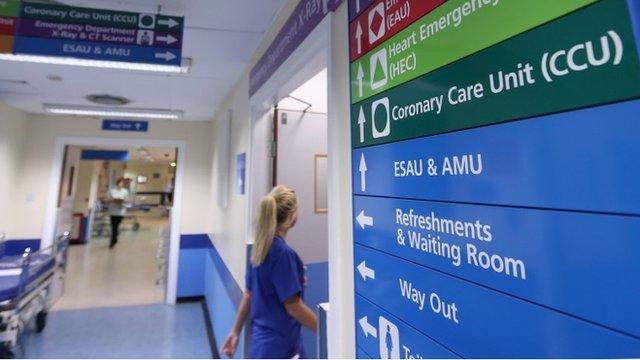
- Published30 October 2014
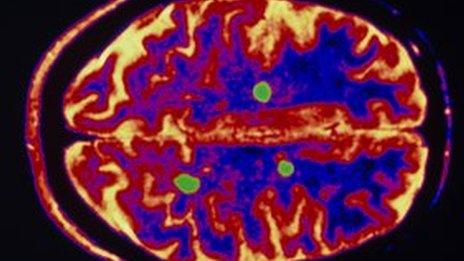
- Published30 October 2014
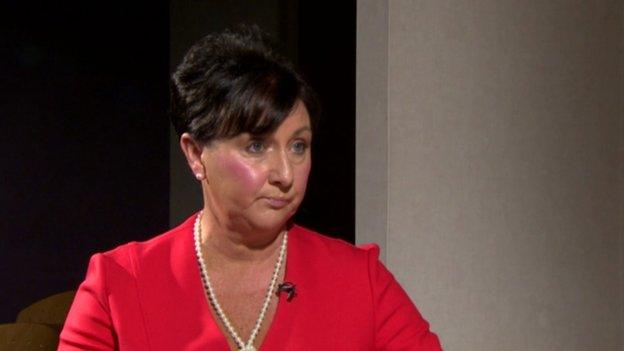
- Published14 October 2014

- Published13 October 2014
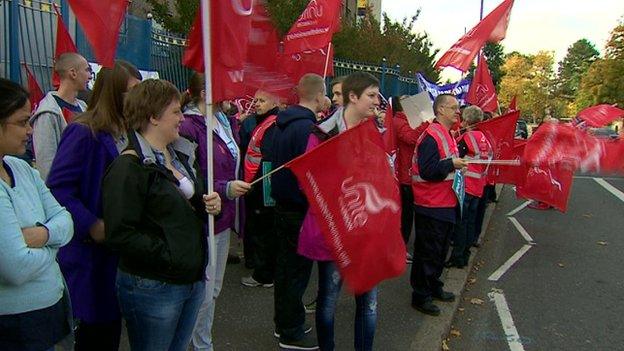
- Published1 October 2014

- Published25 March 2014
